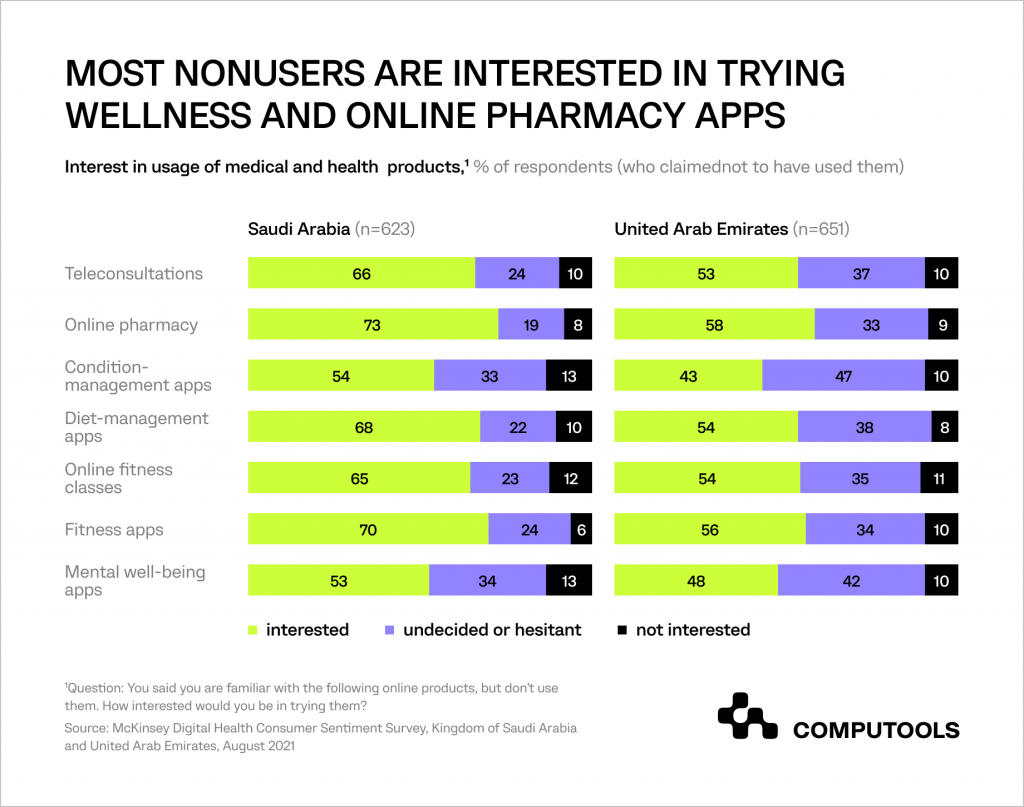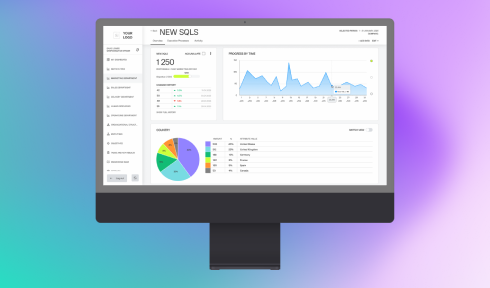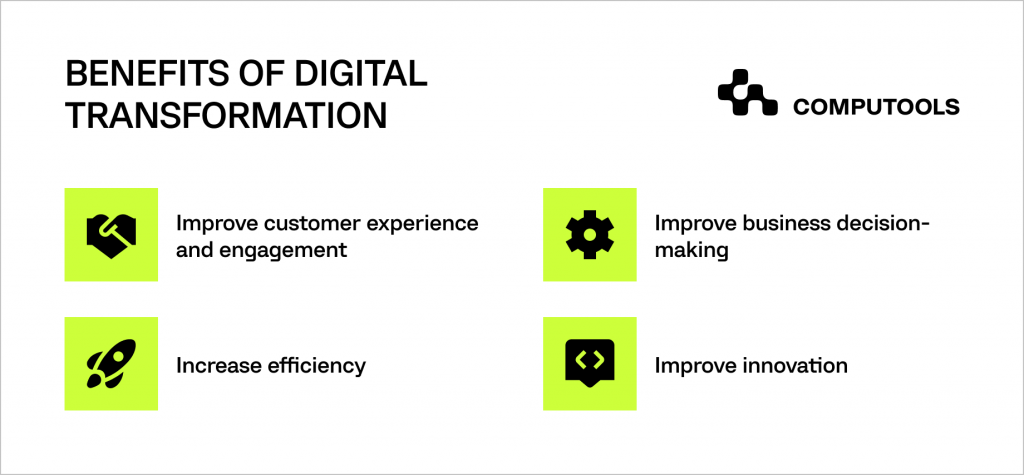Digital transformation is rapidly reshaping the landscape for businesses in the world, spanning start-ups, small and medium-sized businesses and large corporations.
The Middle East is swiftly embracing digitisation, with the UAE leading the charge in digital disruption.
The UAE’s shift toward digital transformation has been propelled by various factors, including the government’s strategic vision, investment from the private sector, and rising consumer demand for digital services.
Statista’s survey revealed that 34 per cent of UAE organisations had instituted comprehensive digital transformation strategies, and nearly 90 per cent of the entities were actively engaged in digital transformation initiatives.
Modern UAE businesses make substantial investments in cutting-edge technologies, such as AI, IoT and cloud computing. These investments are geared towards optimising operations, enriching customer experiences and extracting valuable insights from data.
Furthermore, the UAE’s commitment to digital progress is exemplified by significant strides in 5G technology and an increased emphasis on smart city initiatives. These innovations create a strong foundation for a digital era, making the UAE a Middle East leader in technology and connectivity.
In today’s UAE market, the statistics also speak volumes about the rapid digitalisation efforts. Forbes highlights the UAE’s allure for businesses of all sizes, attributed to its business-friendly environment and the rapid expansion of key sectors like e-commerce, fintech, edtech, and digital healthcare.
Significantly, the healthtech market in the region is projected to achieve an astonishing value of $11 billion by 2025.
Following the impact of the COVID-19 pandemic, there has been a remarkable upswing in demand within the wellness industry.
In fact, almost half of surveyed non-users have shown a strong interest in adopting digital health products, indicating a substantial shift towards innovative solutions in the health sector.

While the potential for growth is immense, there are still unique challenges faced by each sector in the UAE. Start-ups wrestle with limited resources, requiring innovative solutions on tight budgets.
SMEs face challenges in efficient scaling, hindered by insufficient infrastructure for extensive digitalisation.
Enterprises, although better equipped, struggle with the complexity of integrating digital technologies into their existing frameworks.
This article delves into the evolutionary power of digital transformation for UAE businesses, presenting a roadmap to navigate the innovation journey with ease.
What Is Digital Transformation and Why Is It Important?
In simple words, digital transformation is the integration of digital technologies into all aspects of business.
But, the process of digital transformation is not merely about adopting new technologies; rather, it represents a fundamental shift in how businesses operate.
At its core, digital transformation involves leveraging digital tools and technologies to streamline processes, enhance customer experiences and drive innovation.
Transformation may be conducted on different levels:
• Technology Level: Implementation of cutting-edge technologies like artificial intelligence, cloud computing, IoT and data analytics empowers businesses with advanced tools and insights.
• Cultural Level: Digitalisation helps to cultivate a mindset focused on digital advancement across all levels of an organisation, from leaders to staff.
• Customer Satisfaction Level: Transformation empowers businesses to offer seamless, personalised and efficient experiences.
Through data analytics and AI-driven insights, businesses can understand customer preferences, anticipate needs and tailor their offerings, leading to higher customer loyalty.
• Performance Level: Digital transformation allows businesses to automate routine tasks, reducing human errors and enhancing overall efficiency.
Streamlining operations leads to significant time and cost savings.
• Decision-Making Level: Tools of digital transformation equip executives with the tools to harness data meaningfully.
Advanced analytics provide actionable insights, enabling businesses to make informed decisions, identify trends and forecast market demands, thus gaining a competitive edge.
Digital transformation services encompass a wide array of options, with popular choices including business process automation, business intelligence tool implementation, strategic consulting, digital marketing, AI solutions and cloud computing.
These offerings cater to diverse business needs, ensuring organisations can streamline processes and gain valuable insights.
In the context of the UAE, a nation renowned for its rapid economic growth and technological advancements, digital transformation is not just important – it’s imperative.
Digital transformation fosters entrepreneurship, supports start-ups, and attracts foreign investments.
The UAE government also actively encourages digital transformation initiatives, providing a conducive environment for businesses to innovate and transform digitally.
Digital Transformation: Who? When? How?
WHO Needs Digital Transformation?
• Start-ups
Start-ups stand to gain a lot from digital transformation. In a competitive UAE market, technology adoption can level the playing field.
Utilising effective project management platforms and advanced data analytics tools, start-ups can maximise their limited resources, foster innovation and promptly adapt to changing market needs.
• Small and Medium Businesses
Digital transformation benefits SMEs by automating tasks, managing inventory, and providing personalised services.
Cloud solutions offer cost-effective data storage and advanced tools, while robust CRM systems enhance marketing and customer support. These advancements ensure SMEs remain agile and competitive in the market.
• Enterprises
For big businesses dealing with vast data and complex structures, digital transformation is essential. Advanced ERP systems connect departments, aiding communication.
Big data analytics provide insights for smart decisions. Cloud computing ensures security and flexibility. AI and machine learning predict trends, improving customer experiences and internal processes.
Related Experience

WHEN Does Business Need Digital Transformation?
In the modern UAE digital environment, businesses must evolve to remain competitive.
Here are some signs a business needs digital transformation:
• Outdated Technology: If a business struggles due to outdated systems, upgrading is essential. Modern tech streamlines processes for peak efficiency.
• Poor Customer Experiences: Slow responses and impersonal service alienate customers. Digital tools create seamless, personalised interactions.
• Data Mismanagement: Ineffective use of data hampers decision-making. Digital transformation enables insightful data analytics, aiding in informed and strategic choices.
• Market Competition: Falling behind in digital tech risks losing market share. Staying competitive means embracing digital upgrades to meet evolving market demands.
• Compliance and Security Concerns: Protecting customer data is vital. Modern, secure tech ensures compliance and safeguards sensitive information.
• Employee Productivity: Communication barriers impact teamwork. Digital tools enhance internal communication, boosting overall productivity.
HOW Can Businesses Benefit from Digital Transformation?
Adopting digital transformation offers numerous substantial advantages for UAE businesses:
• Operational Efficiency: Streamlining processes and automating tasks lead to increased efficiency, reducing expenses and boosting productivity.
• Elevated Customer Experiences: Utilising digital tools for personalised interactions and understanding customer needs enhances satisfaction and loyalty among clients.
• Global Market Access: Digital transformation serves as a gateway, enabling seamless entry into international markets and allowing UAE companies to explore global opportunities.
• Competitive Edge: Staying ahead in digital innovation provides businesses with a unique advantage in the dynamic and competitive landscape.
• Environmental Responsibility: Transitioning to digital practices reduces reliance on physical resources, making a substantial contribution to sustainability efforts.
• Financial Benefits: Through optimised processes and reduced manual labour, businesses achieve significant cost savings, positively impacting their financial bottom line.
• Flexibility and Agility: Digital transformation enhances adaptability, enabling businesses to quickly respond to market changes and seize emerging prospects.

Digital Transformation for UAE Businesses: Challenges and Solutions
Digital transformation in the Middle East presents promising avenues for economic growth, better educational opportunities and effective networking.
However, adjusting business processes to innovative strategies is not always easy.
Research from Boston Consulting Group shows that nearly 70% of digital transformation efforts fall short of their objectives, underscoring the importance of understanding potential risks and obstacles in the pursuit of innovation.
Let us explore typical digital transformation challenges in the UAE:
1. Reluctance to Embrace Digital Transformation
Many UAE companies hesitate to fully embrace digital transformation due to concerns about disruption and change management.
Overcoming this reluctance requires strategic planning, effective communication, and showcasing the long-term benefits of digitalisation.
2. Skills Gap in New Technologies
The swift advancement of technology has resulted in a skills gap, especially in fields like AI and data analytics.
One viable decision is outsourcing or utilising augmentation options, which provide access to subject matter expertise solutions.
On a larger scale, businesses can invest in training initiatives and collaborate with educational institutions to bridge this expertise gap.
3. Outdated Business Models
Traditional business models might not align with the demands of the digital age. Adapting operating models to be more agile, responsive, and customer-centric is really important.
This shift ensures businesses are well positioned in the dynamic UAE market.
4. Cybersecurity concerns
The growing digital landscape brings increased cybersecurity risks. UAE businesses must invest in robust cybersecurity measures to safeguard sensitive data, customer information and intellectual property.
Such options as custom software development enhance cybersecurity by providing tailored security features, regular updates, encryption, intrusion detection and scalable solutions to address specific organisational vulnerabilities and safeguard against cyberthreats.
5. Infrastructure
A reliable digital infrastructure is fundamental for digital transformation. Companies need a robust IT framework that includes high-speed internet, cloud computing and advanced communication networks, fostering a conducive environment for tech-driven growth.
6. Laws and regulations
Navigating the legal and regulatory landscape is critical. UAE business owners need to stay abreast of evolving laws related to data privacy and digital transactions.
Adherence to these regulations ensures a smooth and compliant digital transformation journey.
UAE Business Owners’ Guide to Successful Digital Transformation
Every successful journey requires a well-defined map, and the realm of digital transformation is no exception. Implementing innovative changes demands a clear and strategic plan.
It involves the meticulous task of digitalising business processes and harnessing the power of digital tools to enhance efficiency and foster seamless collaboration.
Here, we outline the essential steps to guide you on this transformative journey:
Step 1: Establish Objectives
Start by clearly stating your goals for digital transformation. These goals might involve improving customer experiences, making operations more efficient, increasing productivity, or a mix of these aims. Clarity and specificity are key.
Step 2: Conduct a Comprehensive Audit
Perform an in-depth assessment of your digital capabilities, infrastructure and tools. Identify gaps and areas that require improvement to align with your transformation objectives effectively.
Step 3: Choose Appropriate Technologies
Select technologies that match your goals. Explore cloud computing for scalability, AI for insightful data analysis, and IoT for efficient processes. Customise your tech choices based on your industry and business scale.
Step 4: Engage Key Stakeholders
Recognise that digital transformation impacts various departments. Involve essential stakeholders from these areas in the planning phase.
Their involvement ensures that the transformation strategy addresses their specific needs and concerns, fostering collaboration and alignment.
Step 5: Collaborate and Communicate
Collaboration fuels the UAE’s business landscape. Choosing the right software development partner that provides digital transformation services is crucial for the process.
Experienced professionals, familiar with regional nuances in your business algorithms, are essential for a successful journey.
Step 6: Create a Timeline with Milestones
Develop a clear timeline outlining the implementation of all the initiatives. Sequence tasks, assign responsibilities and establish deadlines to ensure a structured and organised approach.
Step 6: Craft a Robust Change Management Plan
Recognise that digital transformation brings about changes in processes, roles and even company culture. Develop a comprehensive change management plan to handle these transitions smoothly and efficiently.
Addressing the human element is also vital to ensure the integration of new practices within the organisation.
Step 7: Evaluate and Adjust
Regularly assess your progress according to your objectives. Gather input from employees, clients and partners.
Be flexible in adjusting your approach and seek subject matter expertise in intricate areas.
Ready to start your digital journey now? Reach out to our specialists at info@computools.com for a free consultation.
Computools
Software Solutions
Computools is an IT consulting and software development company that delivers innovative solutions to help businesses unlock tomorrow.









“Computools was selected through an RFP process. They were shortlisted and selected from between 5 other suppliers. Computools has worked thoroughly and timely to solve all security issues and launch as agreed. Their expertise is impressive.”